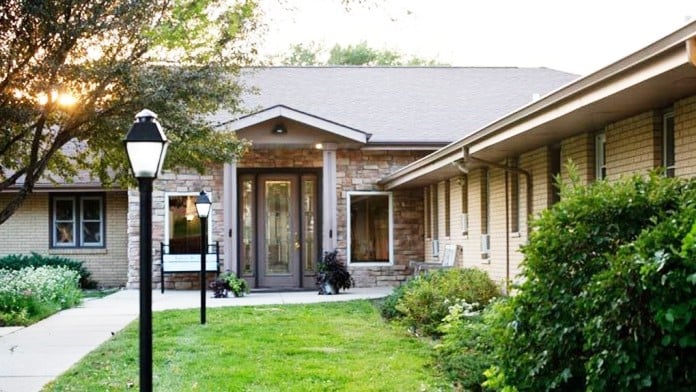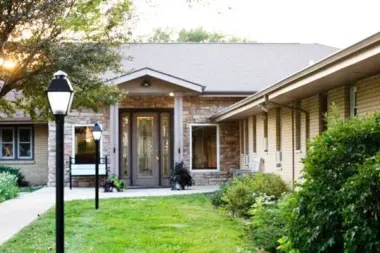This rehab facility fails in every single area a rehab should excel in..They don’t even deserve one star. There is no system/organization period. Food, cleanliness, space, activities. You will go insane here.
About Ivory Plains Recovery Center
Saint Gregory Retreat Center was an addiction and mental health treatment center for women in Adair, Iowa. The center was acquired by Summit BHC and renamed to Ivory Plains Recovery Center. The recovery center focuses on inpatient substance use disorder (SUD) treatment, withdrawal management, and relapse prevention. They accept insurance from many providers and they recently expanded to accept Iowa Molina Medicaid.
A Safe Transition Through Detox in Iowa
Many individuals avoid seeking treatment because they’re afraid that coming off substances will be painful. The detox program at this center is a medically monitored detox. Licensed nurses and medical staff under doctor supervision ensure you safely and comfortably detox so you’re ready to begin the next step of your journey to sobriety.
The 12 Step Recovery Model in a Coed Setting in Adair, Iowa
Adair is about an hour west of Des Moines and easily accessible from Interstate 80. The treatment center is only a half mile from Adair City Park which has picnic tables, restrooms, and RV campsites. The quaint downtown on Main Street is nearby too.
The recovery center offers a coed inpatient program that typically lasts about 30 days. The program may be customized to your needs. The treatment team focuses on building recovery resiliency on a strong foundation through the 12 step approach to treatment.
The focus is on integrated treatment of the spirit, mind, and body. They use the traditional steps that emphasize integrity, courage, willingness, honesty, and an open mind. Clients receive at least six hours of group programs per day in addition to individual therapy.
Day Treatment Options for SUD
The partial hospitalization program (PHP) is an intensive program that many clients participate in after finishing inpatient hospitalization. It’s a good transition from structured 24-hour care to a less restrictive setting.
Day treatment is a good alternative for clients who can’t commit to an inpatient program because of school or work but still need a structured treatment program. Most of your treatment will be group therapy, but you’ll also have weekly individual meetings with a primary counselor.
Rehab Score
Gallery


Accepted Insurance
Other Forms of Payment
Private insurance refers to any kind of healthcare coverage that isn't from the state or federal government. This includes individual and family plans offered by an employer or purchased from the Insurance Marketplace. Every plan will have different requirements and out of pocket costs so be sure to get the full details before you start treatment.
Self-pay involves paying for treatment out of your own pocket. You can use savings or credit, get a personal loan, or receive help from family and friends to fund your treatment. If you don't have insurance or your insurance plan doesn't cover a specific program, self-pay can help ensure you still get the care you need.
Private insurance refers to any kind of healthcare coverage that isn't from the state or federal government. This includes individual and family plans offered by an employer or purchased from the Insurance Marketplace. Every plan will have different requirements and out of pocket costs so be sure to get the full details before you start treatment.
Addiction Treatments
Levels of Care
Residential treatment programs are those that offer housing and meals in addition to substance abuse treatment. Rehab facilities that offer residential treatment allow patients to focus solely on recovery, in an environment totally separate from their lives. Some rehab centers specialize in short-term residential treatment (a few days to a week or two), while others solely provide treatment on a long-term basis (several weeks to months). Some offer both, and tailor treatment to the patient's individual requirements.
Their rehab program doesn’t end when you check out, they also provide support and a game plan for when you leave. A personal recovery coach will be assigned to help you to develop long-term goals, and your coach will be available to help you accomplish those goals. This resource has proven invaluable in helping graduates of St. Gregory Retreat Centers to maintain the motivation and resilience necessary for a life free from substance abuse.
If you've become physically dependent on drugs or alcohol, quitting suddenly can cause very dangerous side effects. During a medically assisted detox, licensed medical professionals will monitor your vitals around the clock and provide medications if necessary to ensure you're as safe and comfortable as possible throughout this process.
Commonly referred to as "day treatment," a partial hospitalization program (PHP) is a short-term, intensive rehab option that provides structured treatment for those who don't require 24-hour care. PHP treatment can also be used as an alternative to inpatient hospitalization or as a "step-down" option. Insurance coverage for PHP treatment varies. Typically, PHP treatment requires a minimum of 20 hours a week and lasts an average of 90 days. PHP treatment often includes relapse prevention strategies, medication management, individual and group therapy, and other behavioral therapy interventions.
Treatments
The goal of treatment for alcoholism is abstinence. Those with poor social support, poor motivation, or psychiatric disorders tend to relapse within a few years of treatment. For these people, success is measured by longer periods of abstinence, reduced use of alcohol, better health, and improved social functioning. Recovery and Maintenance are usually based on 12 step programs and AA meetings.
Drug rehab in Iowa is available in many formats. A variety of inpatient and outpatient options provide programs that are tailored to individual needs, making recovery possible for everyone.
Many of those suffering from addiction also suffer from mental or emotional illnesses like schizophrenia, bipolar disorder, depression, or anxiety disorders. Rehab and other substance abuse facilities treating those with a dual diagnosis or co-occurring disorder administer psychiatric treatment to address the person's mental health issue in addition to drug and alcohol rehabilitation.
Opioid rehabs specialize in supporting those recovering from opioid addiction. They treat those suffering from addiction to illegal opioids like heroin, as well as prescription drugs like oxycodone. These centers typically combine both physical as well as mental and emotional support to help stop addiction. Physical support often includes medical detox and subsequent medical support (including medication), and mental support includes in-depth therapy to address the underlying causes of addiction.
Substance rehabs focus on helping individuals recover from substance abuse, including alcohol and drug addiction (both illegal and prescription drugs). They often include the opportunity to engage in both individual as well as group therapy.
Programs
Adult rehab programs include therapies tailored to each client's specific needs, goals, and recovery progress. They are tailored to the specific challenges adult clients may face, including family and work pressures and commitments. From inpatient and residential treatment to various levels of outpatient services, there are many options available. Some facilities also help adults work through co-occurring conditions, like anxiety, that can accompany addiction.
Young adulthood can be an exciting, yet difficult, time of transition. Individuals in their late teens to mid-20s face unique stressors related to school, jobs, families, and social circles, which can lead to a rise in substance use. Rehab centers with dedicated young adult programs will include activities and amenities that cater to this age group, with an emphasis on specialized counseling, peer socialization, and ongoing aftercare.
Clinical Services
Cognitive behavior therapy—consistently shown to be the most effective therapeutic method for treatment of substance abuse—shows you how to change your responses to these deeply rooted thought processes. At St. Gregory’s Retreat Centers, you’ll learn to better understand stress and anxiety, and you’ll become equipped to handle difficult emotional situations without the use of drugs or alcohol.
Experiential therapy is a form of therapy in which clients are encouraged to surface and work through subconscious issues by engaging in real-time experiences. Experiential therapy departs from traditional talk therapy by involving the body, and having clients engage in activities, movements, and physical and emotional expression. This can involve role-play or using props (which can include other people). Experiential therapy can help people process trauma, memories, and emotion quickly, deeply, and in a lasting fashion, leading to substantial and impactful healing.
In individual therapy, a patient meets one-on-one with a trained psychologist or counselor. Therapy is a pivotal part of effective substance abuse treatment, as it often covers root causes of addiction, including challenges faced by the patient in their social, family, and work/school life.
Life skills trainings involve all the skills a person must have in order to function successfully in the world. These include time management, career guidance, money management, and effective communication. Truly successful addiction recovery is based on the ability to not only live substance-free, but to thrive. Life skills teaches the practical necessities of functioning in society, which sets clients up for success in life, and therefore sobriety.
Nicotine Replacement Therapy (NRT) is a way of getting nicotine into the bloodstream without smoking. It uses products that supply low doses of nicotine to help people stop smoking. The goal of therapy is to cut down on cravings for nicotine and ease the symptoms of nicotine withdrawal.
Amino acids are the precursors the body uses to produce neurotransmitters such as dopamine, GABA, enkaphalins, norepinephrine, and serotonin. While most programs use medications to mask the problems associated with neurotransmitter dysfunction, the St. Gregory Retreat Center actually works with you to repair and restore the way these chemicals are naturally supposed to function. This program also introduces essential minerals and nutrients to the system, giving the body a rapid boost toward restored health.
Trauma therapy addresses traumatic incidents from a client's past that are likely affecting their present-day experience. Trauma is often one of the primary triggers and potential causes of addiction, and can stem from child sexual abuse, domestic violence, having a parent with a mental illness, losing one or both parents at a young age, teenage or adult sexual assault, or any number of other factors. The purpose of trauma therapy is to allow a patient to process trauma and move through and past it, with the help of trained and compassionate mental health professionals.
Dialectical behavior therapy helps you learn healthier ways to cope with your emotions and life stressors. The goal is to find a balance between acceptance of who you are and the advantages of making changes. You will work with your therapist to strike this balance and develop skills for better emotional regulation.
Amenities
-
Residential Setting
-
Private Setting
Accreditations

The Commission on Accreditation of Rehabilitation Facilities (CARF) is a non-profit organization that specifically accredits rehab organizations. Founded in 1966, CARF's, mission is to help service providers like rehab facilities maintain high standards of care.
CARF Accreditation: Yes
Contact Information
608 North Street
Adair, IA 50002


